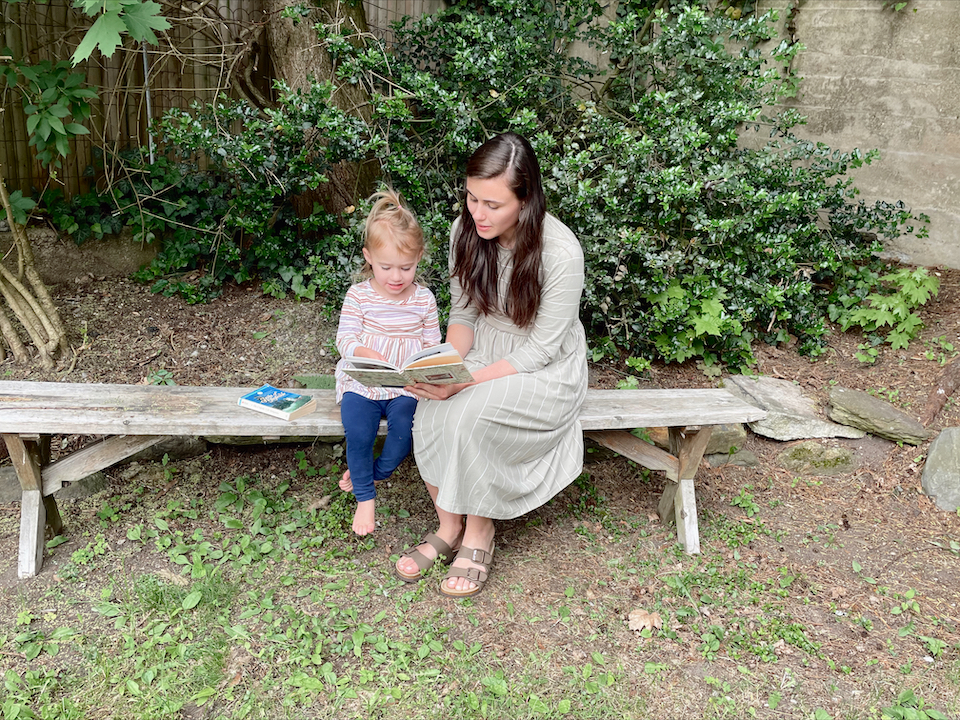Thump! The laundry basket hits the ground with a thud, and I take a seat next to it, preparing to fold. My daughter peers in and pulls out a facecloth, holding it up to her body as if she’s trying to figure out whether it will fit. “Cute!” she cries enthusiastically. I chuckle to myself, half amused by her response to a facecloth and half heart-warmed at her imitation of my reaction when I hold up a dress against her to see whether it will fit.
My days are full of moments like this: watching my daughter repeat an action, expression, or phrase she has heard from me. I continue to delight at her repetition of my “your welcome” to her “thank you Mama”(she still doesn’t understand that it’s a response and not a prompt).
Recently, if my husband or I ask her a question and her answer is in the affirmative, she’ll respond with an exuberant “yeaaahh,” starting the word in a low tone and drawing out the vowels. It’s a mini performance of positivity that makes us laugh every time. Initially, I thought it was a quirk of her own until one day, I heard myself say “yeah” and realized that it sounded like a less exaggerated version of my daughter’s. It hit me suddenly how almost everything she does is an exaggerated, sometimes misunderstood version of my own habits.
In her I see my idiosyncrasies and tendencies magnified through her imitation. Depending on the action, I am either delighted or embarrassed. I never realized how much parenthood would display all my unconscious habits.
Imitation jewelry, imitation art, mock trials, cover bands, there are many names for things that in essence, are all kinds of imitation. Initially, my thoughts towards imitation painted it as a kind of creative laziness. Isn’t originality more valuable? Later that day, I sat down to do some afternoon reading. Coincidently, the author shared these words, “Be imitators of God, as very dear children, and walk in love, as Christ has loved us and delivered himself up for us, a sacrifice breathing out fragrance as he offered it to God.” (Friends of God ,1981 p. 192)
I was startled to read such powerful words on imitation, on the same day I had noticed the role of imitation in my daughter’s development. Suddenly, I realized how necessary imitation is for growth, learning, and even creativity. Even the most talented artists began by imitating the style of their masters. Similarly, I am called to emulate Christ in the same endearing way in which my daughter emulates me.
Sometimes, imitation seems shallow, like an easy way out. It seems fake and insincere to just reproduce something that has already been done. Yet, in another light, it is a powerful first step in the journey of creation. Little children would be lost without the art of imitation. The ability to observe their parents and replicate their actions empowers them to be part of the world in a way that shows them how they belong to it. Imitation spurs them to discover themselves.
What separates the art of imitation from imitation art is that it simply cannot be done with people. Even if we did attempt to become exactly like someone else, we would fail because our unique personhood would always somehow shine through the mask of replication. Fruitful imitation arises from the work of admiration, which draws us to echo the goodness we admire.
As a parent, the role of imitation is taken to its highest level as little children fixate themselves on how to do what we do. It’s both daunting and humbling to recognize that my entire self, all my virtues and vices are on the line, and there will be many ways in which my flaws do not provide the best example. A consistent posture of self-examination helps me strive to mitigate these shortcomings with daily effort.
Not long ago, sometime towards the end of lent, I turned on some sacred music one morning in the effort to add a hint of liturgical relevance to my day. Nestling into a corner of the couch, I sipped my coffee, holding onto the quiet before the day took off. My daughter hoisted herself onto the other side of the couch where she neatly placed her teacup on the nearby shelf, settling in to listen to the music. For a few moments, she was silent, clearly captivated by the meditative melody. I held my breath. She was rarely this still, especially in the morning. As the music played on, she carefully took a sip of her tea, tipping the cup to drink the last imaginary drop. I stifled a laugh, careful not to directly look at her for fear of breaking the spell.
In this moment, I saw myself in my daughter, sipping my morning coffee on my favorite corner of the couch. But I also saw her budding individuality, in rosy innocence, captivated by beautiful music. While I could watch her drink pretend tea all day, as her mother, when I see her admiration of goodness spark, I leap to feed the flame. Because the art of imitation is only a means towards the slow, thoughtful work of becoming a person dedicated to breathing out the fragrance of truth, beauty, and goodness only found in Christ.




